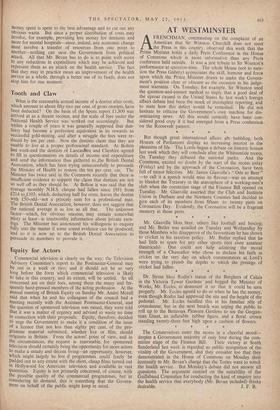AT WESTMINSTER
AFRENCHMAN, commenting on the complaint of an American that Sir Winston Churchill does not meet the Press in this country, observed this week that the Prime Minister holds a daily Press ,Conference in the House of Commons which is more informative than any Press conference held outside. It was a just tribute to Sir Winston's performance•at question-time. The whole House (not to men- tion the Press Gallery) appreciates the skill, humour and force upon which the Prime Minister draws to make the Govern- ment's position clear or obscure as the occasion in his judge- ment warrants. On Tuesday, for example, Sir Winston used the question-and-answer method to imply that a good deal of the uproar caused in the United States by last week's foreign affairs debate had been the result of incomplete reporting, and to state how this defect would be remedied. He did not hesitate to criticise the Government's own machine for dis- seminating news. All this would certainly have been con- sidered good copy if it had emerged from a Press conference. 'on the Roosevelt pattern.
* * * * But though great international 'affairs dte bubbling, both Houses of Parliament display an increasing interest in the pleasures of life. The Lords began a debate on historic houses last week which they will conclude after the Whitsuntide recess. On Tuesday they debated the national parks. And the Commons, excited no doubt by the start of the recess today (Friday) and by the approach of the Coronation, have been full of minor felicities. Mr. James Glanville's " Ode to Beer " —to call it a speech would miss its flavour—was an attempt to blanket the Treasury in the atmosphere of a working-men's club when the committee stage of the Finance Bill opened on Tuesday. Mr. Glanville asserted that the Club and Institute Union in Durham and the Northern Counties had decided to give each of its members from fifteen to twenty pints on Coronation Day. Evidently, the Coronation will be a fragrant memory in those parts.
* * * * Mr. Glanville likes. beer; others like football and boxing; and Mr. Butler was assailed on Tuesday and Wednesday by those Members who disapprove of the favouritism he has shown to cricket in his taxation policy. Mr. Butler replied that he had 'little to spare for any other sports (not even amateur theatrieals). One could not help admiring the moral strength of a Chancellor who chose to declare his faith in cricket on the very day on which commentators at Lord's were trying to plumb the depths to which the prestige of cricket had fallen. * * * * Dr. Stross likes Rodin's statue of the Burghers of Calais in the Victoria Tower Gardens and begged the Minister of Works,' Mr. Eccles, to dismount it so that it could be seen properly. Mr. Eccles agreed to do so when he has the money, even though Rodin had approved the site and the height of the pedestal. Mr. Eccles handled this in his familiar role of connoisseur, but in the next breath was urging the public to roll up to the Battersea Pleasure Gardens to see the Gargan- tuan Giant, an inflatable rubber figure, and a floral crown standing twenty-three feet high upon a cushion of flowers.
The Conservatives enter the recess in a cheerful mood— despite a Government majority of only four during the com- mittee stage of the Finance Bill. Their victory at South Sunderland last week is regartled as public recognition of the vitality of the Government, and they consider too that they demonstrated in the House of Commons on Monday their immunity to Mr. Bevan's charge that the Tories want to wreck the health service. But Monday's debate did not answer all questions. The argument centred on the suitability of the Guillebaud Committee for conducting the kind of enquiry into the health service that everybody (Mr. Bevan included) thinks


































 Previous page
Previous page